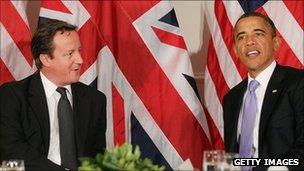David Cameron 'desperate' for Middle East peace
- Published

Barack Obama said he had an "excellent friendship" with David Cameron
David Cameron said he was "desperate" to get the Middle East peace process moving, as he held talks in New York with Barack Obama.
The UK prime minister, who addresses the United Nations later, also said Libya was moving to a "good conclusion" after the ousting of Colonel Gaddafi.
His US visit comes as the Palestinians are pushing for full statehood recognition from the UN.
The US says it will veto the move, but the UK has not stated its intention.
President Mahmoud Abbas has vowed to press ahead with the bid for statehood.
If he does so, the issue will be discussed by the the 15-member UN Security Council, over which the UK, US, France, Russia and China each hold a veto.
The council must back the idea if it is to be considered by the 193-member UN General Assembly, where it still needs the approval of two-thirds of members to succeed.
'Strong relationship'
As he met Mr Obama at the Waldorf Astoria Hotel in New York, Mr Cameron told reporters: "We worked very closely together on Libya, and I think we're getting to a good conclusion there, with a real chance of freedom and democracy for those people.
"We're working closely together on Afghanistan, also the Middle East peace process, where we're desperate to get that moving again.
"And I'm looking forward to discussions on the world economy, which we will follow up in Cannes at the G20, where we've got to get the world economy moving."
He added: "So these are very important times. I think the relationship is as strong as it's ever been, and it's been a pleasure working with you these last 16 months."
Mr Obama hailed the "extraordinarily special relationship between the United States and the United Kingdom".
And he added: "I am very fortunate that over the last year or two David and I have been able to, I think, establish an excellent friendship as well."
'Keenly interested'
He said the two men had "worked closely together to help bring about freedom and peace in Libya. We have coordinated closely in managing a very difficult time for the global economy".
He also said the US and UK were "keenly interested" in advancing Israeli-Palestinian peace.
If the Palestinians do not pursue their demand for full statehood, an alternative course would be to push for a lesser "observer member" status.
This would mean greater recognition from the UN, but would short of full nationhood. Such a change could be passed by the general assembly without prior approval from the security council.
Mr Cameron also met Prince Saud of Saudi Arabia and President Dilma Rousseff of Brazil during talks on Wednesday.
It was announced that Prince Saud would visit the UK later this year.
Mr Cameron is scheduled to address the UN General Assembly at 1745 BST on Thursday.
After this he will fly to Canada for talks with Prime Minister Stephen Harper and a speech to the country's parliament, before returning to the UK.
- Published22 September 2011
- Published21 September 2011
- Published21 September 2011
- Published21 September 2011
- Published15 September 2011